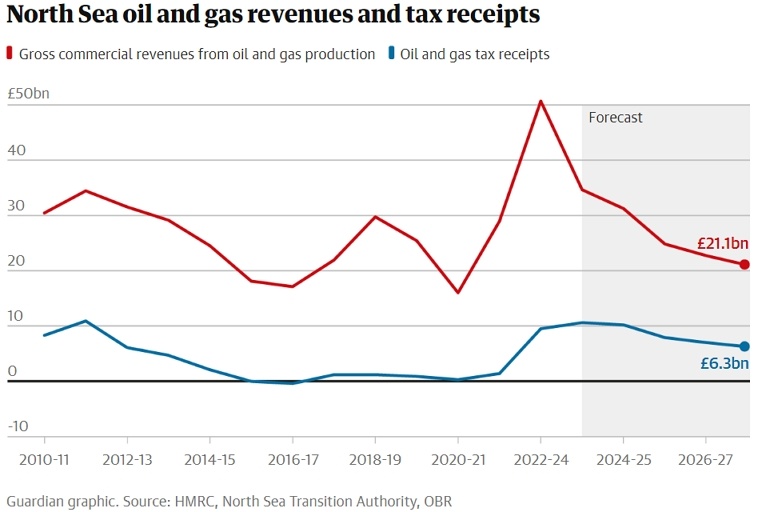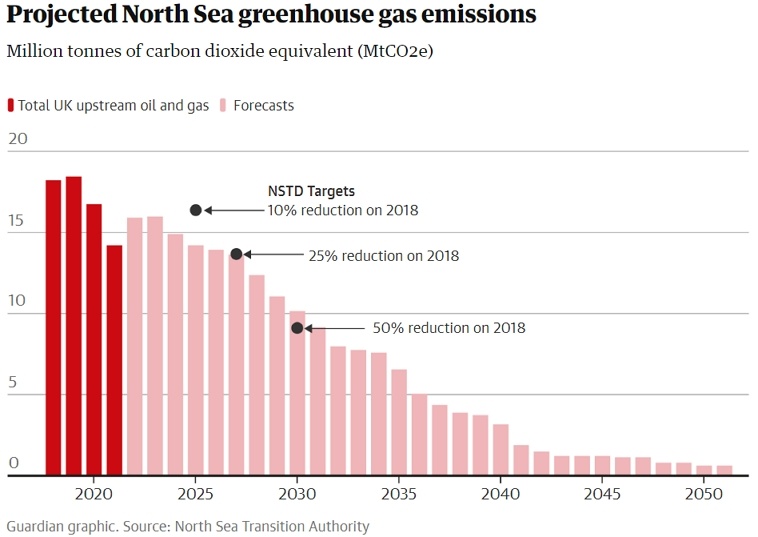As the UK considers a new gasfield, the question arises: Is additional fossil fuel production necessary or advisable in light of its climate commitments? Despite concerns raised by energy economists and climate scientists about the global implications of developing new fossil fuel projects, the UK government is deliberating over the approval of a significant oil and gas field in the North Sea.
The proposed Rosebank oilfield, with its potential to yield up to 500 million barrels of oil, has sparked a clash between ministers and climate campaigners. While the government emphasizes its commitment to staying within carbon budgets, ensuring energy security, and fostering economic growth, finding clear-cut solutions to the questions raised in this debate remains challenging.
Can the UK Achieve Its Climate Targets?

Uplift, a campaign group opposing new North Sea drilling, argues that the emissions resulting from extracting oil and gas from the Rosebank field would surpass the targets outlined by the Climate Change Committee (CCC), the government’s independent climate advisors, for the oil and gas sector.
While approving the Rosebank oil and gas field may not directly result in the UK exceeding its carbon budgets, it would likely necessitate greater emission reductions in other sectors. The CCC has acknowledged the lack of clarity regarding whether the UK should pursue new oil exploration, as the decision involves complex considerations.
Last year, Lord Deben, chair of the Climate Change Committee, wrote a letter to the business secretary expressing that the committee was unable to determine the net impact of new North Sea oil and gas projects on global emissions. Lord Deben also noted that the UK is expected to remain a net importer of fossil fuels in the foreseeable future, which implies potential benefits in terms of domestic oil and gas production compared to higher-carbon footprint imports.
According to Lord Deben, ministers should prioritize implementing policies that reduce the demand for fossil fuels, thereby minimizing the need for imports. Additionally, he suggested that stringent assessments should be applied to new domestic production, with a presumption against exploration.
What is the Necessary Amount of Oil and Gas for the UK?
Fossil fuels continue to play a significant role in meeting the UK’s energy needs, with approximately 61 million tonnes of oil and 77 billion cubic meters of gas consumed last year. These fossil fuels accounted for approximately three-quarters of the country’s total energy demand.
The reliance on fossil fuels in the UK is evident as 24 million homes depend on gas boilers for heating and hot water, while 32 million vehicles run on petrol or diesel fuel. Furthermore, gas plants contribute to generating 42% of the country’s electricity.
Simultaneously, the reserves in the North Sea are experiencing a significant decline. Data from the North Sea Transition Authority indicates that North Sea oil and gas production is projected to decrease from slightly over 90.3 million tonnes of oil equivalent in 2019 to just over 46.3 million within the next five years.
According to Mike Tholen, a director at Offshore Energies UK (formerly known as Oil and Gas UK), the natural long-term decline of the North Sea implies that the UK’s oil and gas production will never see an increase. However, he emphasized that some new exploration is still necessary to prevent the industry from experiencing a freefall, which could significantly heighten the UK’s dependence on imports and have negative repercussions on jobs and the economy.
Exploring the Option of Importing Fossil Fuels for the UK

Following the invasion of Ukraine, European governments have grown increasingly cautious about depending on foreign nations for their energy supplies.
As the UK is currently a net energy importer, it relies on gas imports from Norway and continental Europe through pipelines, as well as liquefied natural gas (LNG) shipments from Qatar and the US. It is worth noting that several of these import sources have a higher carbon footprint compared to oil and gas produced in the North Sea.
LNG shipments, especially those from the US, carry a significant carbon footprint, which is more than six times larger compared to North Sea extraction. Similarly, LNG imports from Qatar result in a carbon footprint three times larger.
Norway stands out as an exception in terms of lower emissions intensity in gas production compared to many countries, including the UK. This is attributed to its strict regulations on gas flaring and the use of clean electricity to power rigs. Moreover, Norway has the advantage of transporting a significant portion of its UK gas exports via pipeline, which reduces emissions compared to condensing, chilling, and transporting cargoes by sea. However, the existing main pipeline into the UK is already operating at full capacity, and Norway’s largest gasfield is experiencing a decline, limiting the possibility of a substantial increase in imports.
Striking a Balance: Meeting the UK’s Fossil Fuel Needs while Addressing Climate Responsibilities
Amidst a contentious debate characterized by differing assertions and rebuttals, there is one point of consensus among all parties involved: the UK needs to take stronger measures to decrease its dependence on fossil fuels.
Addressing the escalating need for oil and gas would present the UK government with a smoother challenge in curbing fresh exploration and production in the North Sea, mitigating the potential for an “energy gap” or escalating market costs.
According to experts, the government should not only focus on policies to promote the adoption of electric vehicles and heat pumps but also develop ambitious strategies to enhance the electricity grid to accommodate the surge in car chargers. Additionally, measures to enhance energy efficiency in residential and industrial buildings through improved insulation should be implemented.
Implementing these changes would necessitate substantial government investment, amounting to billions of pounds. However, a potential solution may lie within the North Sea region. The Office for Budget Responsibility predicts a significant increase in oil and gas receipts, with projections reaching £11 billion in 2022-23, a substantial surge compared to the £300 million received just two years prior. This presents an opportune moment to utilize North Sea oil revenues to mitigate the necessity for future North Sea projects, thereby reducing Britain’s reliance on them.

